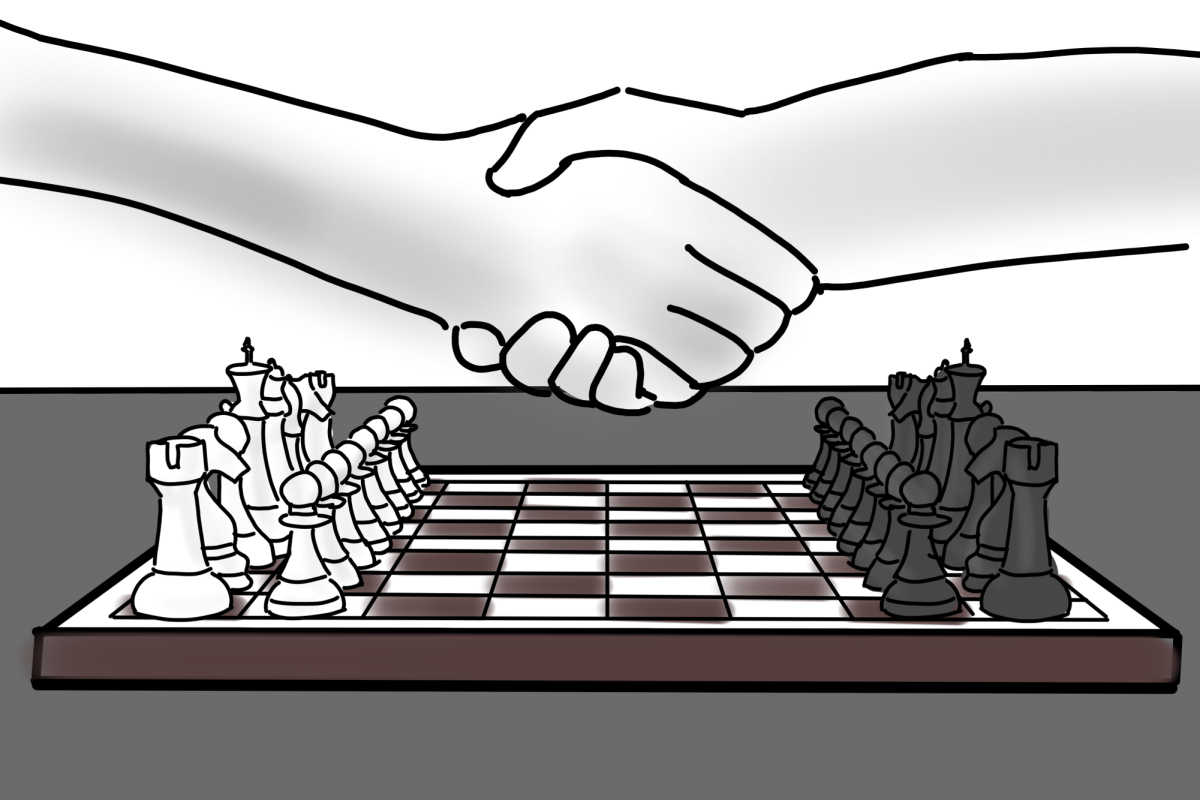Chess is Lakeside’s secret sports team
Timothy D. ’27
When the winter sports season ended and Mr. Hartley, Lakeside’s athletic director, was listing off the achievements of Lakeside’s various teams at assembly, I felt immense pride in our school. That feeling quickly disappeared. Because when Mr. Hartley stopped, I felt shocked, betrayed, and ignored because he had forgotten to mention the Metro League sport that Lakeside had held the title for years without a single loss: chess.
When the word “sport” gets used, it’s usually referring to more traditional activities like soccer, tennis, and crew — rarely chess. Despite the acute lack of physical exertion required to play, chess should still be considered a sport for the amount of strategy, planning, and practice required to succeed.
Not only have Lakeside and other schools recognized chess as a sport by including it in the Metro League, but the International Olympic Committee (IOC) recognizes it as a sport as well. On their website, the International Chess Federation (FIDE) is listed as one of the “recognised federations.” FIDE also says they were recognized by the IOC as a “Global Sporting Organization” in 1999 and are one of the oldest global sports coalitions.
The Oxford English Dictionary defines a sport as “an activity involving physical exertion and skill, esp. (particularly in modern use) one regulated by set rules or customs in which an individual or team competes against another or others.” Chess has a rule set, so-called “customs,” and fierce competition. Still, there’s the glaring issue of the lack of physical effort required to play. But when sports like golf, archery, and even shooting are featured in the Olympics, it poses the question: Is physical exertion really the only thing that defines a sport?
In fact, when considering sports, brute force has never solely been the way to go. Nobody dashes blindly onto a field expecting to win a medal (unless they’re running track, of course). Many Olympic sports require careful handling and calculations on top of pure strength. For instance, soccer is all about predicting and responding to your opponent’s actions as well as preparing strategies to score effectively, which is incredibly similar to how chess is played.
A better way to evaluate sports would be the strategy involved. After all, soccer is just people moving in a way to get a ball in a designated zone; running and kicking just so happen to be the means — not the goal. Therefore, more plausible criteria for a sport might value competition and strategy instead. And no sport has more strategy than chess.
As a member of the chess team, we may not be flashing our giant lacrosse sticks or lugging around heavy bags stuffed with multi-sized golf clubs, but we still have the same competitive spirit, camaraderie, and commitment of any other varsity sport. And even though our practices usually come with Asian takeout or pizza, it doesn’t make us any less important. Chess is more than just a hobby for many people — it’s something people spend lots of time getting good at, just like football or basketball. I say we should start talking about chess more often and start addressing it by what it truly is: a sport.
–
Chess is More Than A Sport
Rohan D. ’25
Chess is not a sport. It’s an intercultural icon that has withstood the test of time and space — from 500 C.E. to today and from South Africa to Siberia.
Soccer is the most popular sport in the world with around 265 million active players. Chess, on the other hand, has almost 700 million. In the United States, the number of adult chess players equals the number of adults who play any sport. I myself have played for a decade and still enjoy the game today (I usually lose to Timothy at chess club meetings the one time per semester I go.) There are several reasons why chess isn’t a sport — ranging from the dryly lexical to the properly philosophical — but let’s hit the main, linguistic point first.
I will admit that, if we are going off of dictionary definitions, Timothy’s assertion does have some credence. However, when declaring that activities fall into this category or that one, we must be careful not to squeeze all meaning out of either. Suppose that we did assign chess the moniker of “sport.” What happens then? Surely, activities like debate — which involves dozens of types of strategies and is certainly more physically demanding than chess, thanks to debaters’ insistence on standing up and shouting at their audience from dozens of feet away (I should know since I’m a debater) — should be considered a “sport.”
This extension of the term “sport” sees almost no bounds: Math competitions are similar in physical exertion to chess, and though they don’t see two players or teams competing head-on, neither does slalom skiing or javelin-throwing.
To call chess a sport is to degrade the game from a category of its own to a mere subcategory of something else.
And now that we’ve thrown the lid to Pandora’s box across the room and shattered it into a million pieces, we begin to see the monster we’ve unleashed: We’ve essentially defined everything as a sport. And therein lies the main issue with classifying chess a sport: The word loses all meaning. Football and math competitions don’t share much in common. Sure, they both require some form of strategy but I’m willing to bet there does not exist a single activity or goal worth pursuing that doesn’t require some amount of forward thinking.
There are perfectly acceptable monikers for activities like chess that are not a sport. For example, we could call chess an activity or a board game — both of which it undeniably is. We could also leave aside any specific term — as we do with other disciplines: like music, chess is a profession, a performance, and fun for many. Music does not fall into another, broader categorization, because it doesn’t need to for people to understand what a musical performance is. In the same way, chess doesn’t need to fall into the category of “sport” — or anything else, for that matter. I agree with Timothy that it’s unfortunate that the chess team doesn’t always get the recognition it deserves.
Furthermore, are we really to believe that calling chess a sport will fix most — or any — of the issues with recognition it faces? There are innumerable sports that I’d argue are much worse off when it comes to notoriety. More people know who Magnus Carlsen is than Sun Yingsha (the world’s top table tennis player). I agree with Timothy that it’s unfortunate that the chess team doesn’t always get the recognition it deserves — but to be fair, the same could be said of the math team, ethics bowl, or Lakeside Orchestra’s chamber music groups. The issue here is not chess’s designation but those entrenched norms that resist change so heavily.
Language is a democratic business — a word means what it does because the majority of the population uses it in that way. When a majority say chess is not a sport, when one would have difficulty arguing so without resorting to technicalities, when little is likely gained (and arguably more is lost) by calling it so, we cannot ignore the truth.





